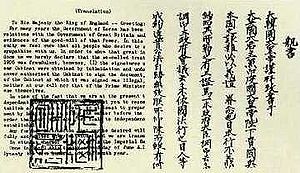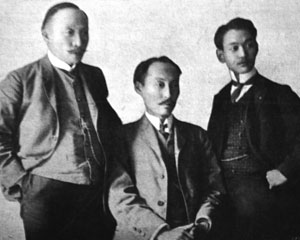Please add Korean script to this article, where needed. |
The Japan-Korea Protocol of August 1905 was made between representatives of the Empire of Japan and the Korean Empire in 1905. [1] Negotiations were concluded on August 13, 1905. [2]
Please add Korean script to this article, where needed. |
The Japan-Korea Protocol of August 1905 was made between representatives of the Empire of Japan and the Korean Empire in 1905. [1] Negotiations were concluded on August 13, 1905. [2]
This treaty granted permission to Japanese vessels to navigate coastal and inland waters of Korea. [2]
The treaty preamble asserted that the Envoy Extraordinary and Minister Plenipotentiary of His Majesty the Emperor of Japan and the Minister of State for Foreign Affairs of His Majesty the Emperor of Korea were "respectively duly empowered" to negotiate and to agree upon the specific language of the proposed bilateral treaty: [3]
Japanese vessels shall be at liberty to navigate along the coasts and in inland waters of Korea for the purpose of trade in accordance with the stipulations of the present Agreement, which, however, shall not be applicable to navigation between the open ports. [3]
Licenses shall be obtained for all Japanese vessels to be employed in navigation of the coasts and inland waters, upon reporting through the Japanese Consular Officers to the Korean Customs the names and residence of the owners, the names, types and carrying capacity of the vessels, as well as the limits within which such vessels are to navigate. Licenses shall be available for one year from the date of their issue. [3]
Upon receipt of the licenses, fees shall be paid to the Korean Customs .... [3]
Japanese vessels may freely navigate within the limits specified, but shall not proceed to any place not in Korean territory, except in case of stress of weather or other emergency, or in case special permission has been obtained from the Korean Customs. [4]
The licenses shall be carried on board the vessels during their voyages and shall be shown whenever requested by the Korean Customs, or by local officials of Korea, or by the Chiefs of villages duly authorized by such local officials. [4]
Japanese shipowners shall have liberty to lease land for the purpose of building warehouses at the places where their vessels call. Such owners may also construct piers or wharves on the banks and coasts with the permission of the Korean Customs. [4]
In case of infraction of the present Agreement by a Japanese vessel, the Korean Customs may cause the license of such vessel to be confiscated, or may refuse to issue a new one, if the offence be found, upon examination, to be of a grave nature. [4]
When a Japanese vessel, or the crew thereof, infringes the stipulations of the present Agreement or of other treaties, or when a member of the crew commits any crime, the Japanese Consular Officers shall deal with the case in accordance with the provisions of the treaties and the laws of Japan. [4]
The present Agreement shall remain in force for a period of fifteen years from the date of its signature, and after the expiration of such period, further arrangements may be made by mutual agreement. [4]

This "alleged treaty" was contrived in a coercive process; [2] and Koreans sought to invalidate the unwanted consequences by presenting evidence to the international community. For example,
This treaty was confirmed to be "already null and void " by Treaty on Basic Relations between Japan and the Republic of Korea concluded in 1965. [8] In 2010, Japan argued that the chronological point of reference for "already null and void" was August 15, 1948, when the government of the Republic of Korea was established. This point of view is disputed by the Korean analysis, which construes the 1965 treaty as acknowledgment of the nullification of all Japanese-Korean treaties and agreements from 1904 onwards. [9]
The unequal treaties were a series of agreements made between Asian countries—most notably Qing China, Tokugawa Japan and Joseon Korea—and Western countries—most notably the United Kingdom, France, Germany, Austria-Hungary, Italy, the United States and Russia—during the 19th and early 20th centuries. They were often signed following a military defeat suffered by the Asian party, or amid military threats made by the Western party. The terms specified obligations to be borne almost exclusively by the Asian party and included provisions such as the cession of territory, payment of reparations, opening of treaty ports, relinquishment of the right to control tariffs and imports, and granting of extraterritoriality to foreign citizens.

The Japan–Korea Treaty of 1910, also known as the Japan–Korea Annexation Treaty, was made by representatives of the Empire of Japan and the Korean Empire on 22 August 1910. In this treaty, Japan formally annexed Korea following the Japan–Korea Treaty of 1905 and the Japan–Korea Treaty of 1907.

The Japan–Korea Treaty of 1905, also known as the Eulsa Treaty, Eulsa Unwilling Treaty or Japan–Korea Protectorate Treaty, was made between the Japanese Empire and the Korean Empire in 1905. Negotiations were concluded on November 17, 1905. The treaty deprived Korea of its diplomatic sovereignty and made Korea a protectorate of Imperial Japan. It resulted from Imperial Japan's victory in the Russo-Japanese War in 1905.
The Japan–Korea Treaty of 1904 was made between representatives of the Empire of Japan and the Korean Empire in 1904. Negotiations were concluded on 23 February 1904. Though Korea declared neutral to Russo-Japanese War, Japanese troops entered Seoul on 9 February 1904, declared war on Russia, and kidnapped some pro-Russians in Korea, including Lee Yong-ik (이용익). The treaty was confirmed invalid in 1965 by Treaty on Basic Relations between Japan and the Republic of Korea
The Japan–Korea Treaty of 1907 was made between the Empire of Japan and the Korean Empire in 1907. Negotiations were concluded on July 24, 1907.

The Hague Secret Emissary Affair resulted from Emperor Gojong of the Korean Empire sending confidential emissaries to the Second Peace Conference at The Hague, the Netherlands, in 1907.
A Treaty of Peace, Amity, Commerce and Navigation, also known as the Shufeldt Treaty, was negotiated between representatives of the United States and Korea in 1882.
The France–Korea Treaty of 1886 was negotiated between representatives of France and Korea.
The Italy–Korea Treaty of 1884 was negotiated between representatives of Italy and Korea.
The Russia–Korea Treaty of 1884 was negotiated between representatives of Russia and Korea.
The Germany–Korea Treaty of 1883 was negotiated between representatives of Germany and Korea.
The United Kingdom–Korea Treaty of 1883 was negotiated between representatives of the United Kingdom and Korea.
The Austria–Korea Treaty of 1892 was negotiated between representatives of the Austro-Hungarian Empire and Joseon Korea.
The Belgium–Korea Treaty of 1901 was negotiated between representatives of the Kingdom of Belgium and the Korean Empire.
The Denmark–Korea Treaty of 1902 was negotiated between representatives of the Kingdom of Denmark and the Korean Empire.
The Japan–Korea Protocol of August 1904 was made between representatives of the Empire of Japan and the Korean Empire in 1904. Negotiations were concluded on August 22, 1904.
The Japan–Korea Protocol of August 1905 was made between the Empire of Japan and the Korean Empire in 1905. Negotiations were concluded on April 1, 1905.